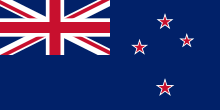New Zealand at the 1976 Summer Paralympics
| New Zealand at the 1976 Summer Paralympics |
|||||||||
|---|---|---|---|---|---|---|---|---|---|
 |
|||||||||
| IPC code | NZL | ||||||||
| NPC | Paralympics New Zealand | ||||||||
| Website | paralympics |
||||||||
| in Toronto | |||||||||
| Competitors | 7 | ||||||||
| Medals |
|
||||||||
| Summer Paralympics appearances | |||||||||
New Zealand sent a 12 sportspeople strong delegation to the 1976 Olympiad for the Physically Disabled in Toronto, Ontario, Canada. At these Games, New Zealand won 13 medals at the 1976 Summer Paralympics: 7 golds, 1 silver and 5 bronze medals. Eve Rimmer was the most decorated Paralympian at these Games, winning 5 gold medals in athletics.
These Games were New Zealand's third Summer Games appearance. They missed the Winter Games in the same cycle. Political factors involving a South African rugby tour in New Zealand led to a boycott of the 1976 Games by some countries. New Zealand's role in inviting South Africa to the country led to additional scrutiny regarding their participation in Toronto.
The Games represented the country's third appearance at the Summer Games, having missed the first two editions in 1960 in Rome and the 1964 Games in Tokyo. Starting in the 1976 for the Games, governance was managed by Paralympics New Zealand. This organization continues to be responsible for Paralympic Games selection in New Zealand.
New Zealand did not participate in the 1976 Winter Paralympics that took place in Ornskoldsvik, Sweden in the same year.
New Zealand's participation in these Games was not without scrutiny. The country had welcome the South African rugby union team to do a tour of their country. At the same time, South Africa participated in these Games. New Zealand's decision and South Africa's participation led to Uganda, Sudan, Jamaica, India, Kenya and Yugoslavia pulling out of participating in the 1976 Games.
New Zealand's delegation in Toronto was 12 sportspeople strong. The New Zealand delegation at the 1976 Games included Paul Chambers, Graham Condon, Fred Creba, Ross Hynds, Bill Lean, Graeme Marett, Brian McNicholl, Dennis Miller, Doug Moore, Reuben Ngata, Eve Rimmer and Jim Savage.
Condon was competing in his third Games. He would compete in six total Paralympic Games for New Zealand, leading the country in total Paralympic Games appearances.
Creba died in 2013 when he was 68 years old. In 1975, his sporting performances, including setting a world record in weightlifting, earned him the title, "South Canterbury Sportsperson of the Year."
Hynds made his debut at these Games, going on to represent New Zealand at the 1976, 1980, 1984, and 1992 in archery and athletics.
Hynds attended Saint Kentigern Old Collegians. When he was a 22-year-old, he was in a car accident that left him a paraplegic. Starting in 1970, he started competing in New Zealand's National Disabled Championships and would compete in it for 30 straight years. At the 1974 Commonwealth Paraplegic Games, he served as New Zealand's Vice Captain. After the Games, he made the switch to wheelchair rugby, making New Zealand's first national team in 1991. He also took up sailing, representing New Zealand internationally from 1988 to 1998. In 2006, he was awarded Paralympics New Zealand Order of Merit for outstanding service to Paralympic Sport. He died in 2015.
...
Wikipedia
